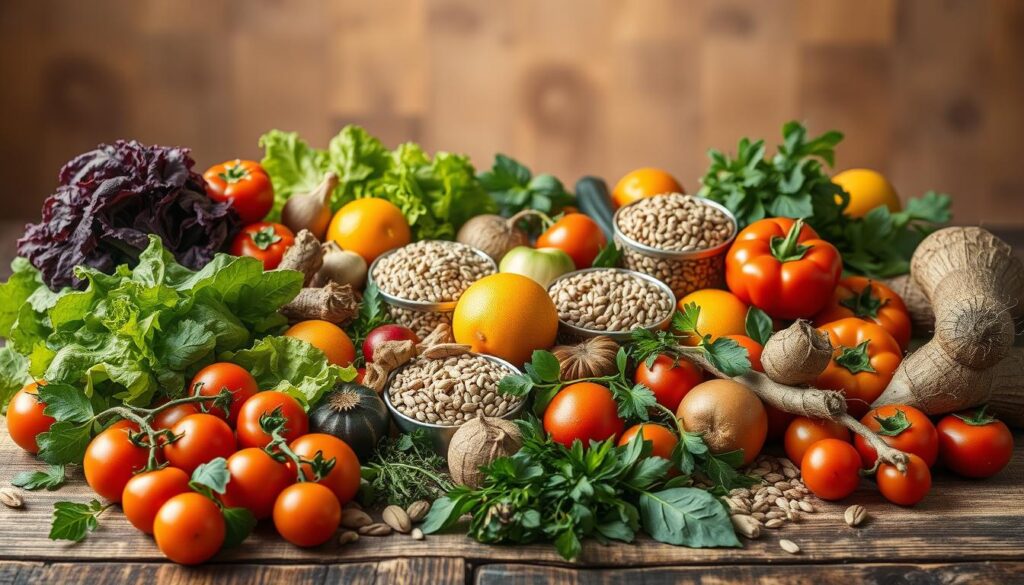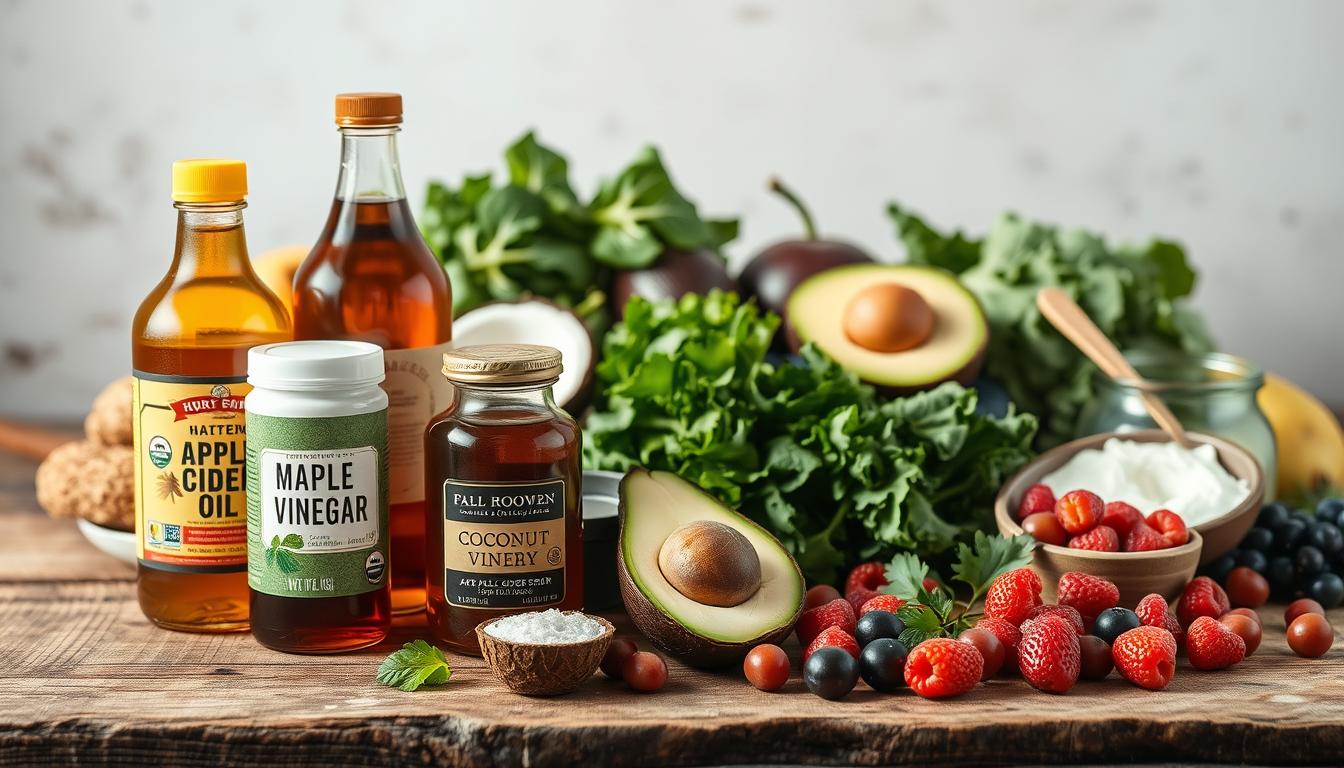We think healthy cooking can be tasty and simple with natural ingredient swaps. Making a few changes can lower disease risks and boost our health. Kathy McManus, MS, RD, LDN, says simple food swaps can cut calories, cholesterol, and stabilize blood sugar. So, we’re eager to share natural ingredients and cooking tips for healthier dinners.
Imagine enjoying your favorite dishes while feeding your body with good stuff. With natural ingredient swaps, it’s doable. For instance, Greek yogurt can replace sour cream for less calories and more protein. Or, olive oil can swap out butter for healthier fats. These tweaks can greatly improve our health.
Key Takeaways
- We can improve our health by making all-natural ingredient substitutions in our daily meals.
- Natural ingredients like Greek yogurt, olive oil, and coconut oil can replace common ingredients to reduce calories and increase nutrition.
- Healthy cooking techniques like reducing sugar and using non-stick spray can also make a big impact.
- Whole wheat flour and quinoa are great alternatives to refined grains, providing more fiber and nutrients.
- By incorporating all-natural ingredient substitutions into our cooking, we can create healthier dinners that are both delicious and satisfying.
- Reducing cheese servings and using part-skim or fat-free cheeses can significantly lower fat intake.
- Switching to low-fat milk options and using evaporated skim milk can also provide a lower-fat alternative.
Understanding All-Natural Ingredient Substitutions
We can make healthier choices by using natural ingredient swaps in our meals. Julia Zumpano, RD, LD, says these swaps boost our nutrition. They add more vitamins, minerals, fiber, healthy fats, and protein.
Choosing all-natural ingredients is a smart start for dietary tips. These ingredients are minimally processed and free from artificial additives. By making simple swaps, we can lower our risk of chronic diseases and boost our energy.
We can add flavor to meals with herbs and spices instead of salt and sugar. Using beans, lentils, or tofu as protein sources adds variety. By adopting these swaps and ideas, we move closer to a healthier lifestyle.
Common Culinary Ingredients to Substitute
When we focus on healthy cooking, making simple swaps in our dinner recipes can really help. By choosing healthier options, we make our meals better for us. This can improve our overall health and well-being.
Ingredients like refined sugars, processed oils, and artificial flavorings are common but not good for us. Swapping them out for natural choices can make our food tasty and good for our bodies.
Refined Sugars
We can replace refined sugars with natural sweeteners like honey or maple syrup. For baking, 1 cup of sugar can be swapped with 1 cup of brown sugar or 1–3/4 cups of confectioners’ sugar.
Processed Oils
Processed oils can be swapped for healthier options like olive or avocado oil. It’s key to pick oils with high smoke points to avoid damage when cooking.
Artificial Flavorings
Artificial flavorings can be replaced with fresh herbs and spices. For example, instead of artificial lemon flavor, use lemon zest or fresh lemon juice for taste.
By making these easy swaps, we can make our dinner recipes healthier and tastier. This promotes healthy cooking and using dietary substitutions.
| Ingredient | Substitution |
|---|---|
| Refined Sugars | Natural Sweeteners (honey, maple syrup) |
| Processed Oils | Healthy Oils (olive oil, avocado oil) |
| Artificial Flavorings | Fresh Herbs and Spices |
Sweetener Swaps for Healthier Desserts
When it comes to natural ingredients for healthier desserts, sweetener swaps are key. We can replace refined sugars with honey, maple syrup, and coconut sugar. This makes healthy dinner ideas both tasty and good for you. These dietary tips help cut down sugar and support a healthier life.
Some popular sweetener swaps include:
- Honey, which is sweeter than sugar and can be used in a 3/4 cup to 1 cup ratio
- Maple syrup, with its unique flavor and possible health perks
- Coconut sugar, which has a lower glycemic index and can be used 1:1 with sugar
By using these natural ingredients in our desserts, we make healthy dinner ideas that are yummy and good for you. Always use natural sweeteners in small amounts for the best results.
With a bit of creativity and trying new things, we can make many healthy dinner ideas. These ideas use sweetener swaps, making our desserts healthier and more fun.
Oil Alternatives for Cooking and Baking
Choosing the right oil for healthy cooking is key. With many options, picking one can be tough. We’ll look at olive oil, avocado oil, and other healthy oils for dinner recipes and baking.
The FDA says using oils high in oleic acid can lower heart disease risk. This makes olive oil a top choice for healthy cooking. Avocado oil, too, adds flavor and is healthier.
| Oil Alternative | Substitution Ratio |
|---|---|
| Applesauce | 1:1 |
| Smashed Avocado | 1:1 |
| Nut Butter | 1:1 |
| Silken Tofu | 1/3 cup for every 1/2 cup of oil |
Using these oil alternatives in healthy cooking and dinner recipes boosts our health. Whether it’s for olive or avocado oil, there are many options to choose from.
Dairy Substitutes for Creamy Dishes
Looking for natural ingredients for creamy dishes? There are many dairy substitutes to choose from. Almond milk is a great option, as it can replace cow’s milk in many recipes. Coconut cream adds a rich, creamy texture to dishes.
For using dairy substitutes, pick unsweetened and unflavored ones. Try different brands and types to find your favorite. Also, check the nutritional content, like calories and fat, to meet your dietary needs.
Here are some popular dairy substitutes for creamy dishes:
- Almond milk
- Coconut cream
- Cashew cream
- Soy milk
Using these dairy substitutes can make your meals delicious and healthy dinner ideas. They are full of natural ingredients and have fewer unhealthy additives. Always follow dietary tips and pick the best option for you.
| Dairy Substitute | Calories per Cup | Fat Content |
|---|---|---|
| Almond Milk | 39 | 2.5g |
| Coconut Cream | 74 | 5g |
| Cashew Cream | 100 | 10g |
Flavor Enhancers: Natural vs. Artificial
Healthy cooking focuses a lot on flavor enhancers. Julia Zumpano, RD, LD, says fresh herbs and lemon juice are great. They add taste to meals without extra salt or sugar. This is key for dinner recipes that taste good and are good for you.
Using natural flavor enhancers in your dietary substitutions can really change your meals. For instance, fresh herbs like basil or oregano bring a lot of flavor. Lemon juice is also a good choice instead of store-bought dressings, which often have preservatives and sugars.

These ingredients can make your meals taste great without losing nutritional value. By making a few simpledietary substitutions, you can start healthy cooking habits. These habits will help you in the long run.
Whole Grains as Substitutes for Refined Grains
We often seek ways to make our meals healthier. One easy way is by adding whole grains to our diet. Whole grains are packed with fiber, vitamins, and minerals. They are a great swap for refined grains, boosting our health.
Whole grains like quinoa, whole wheat flour, and brown rice are full of fiber and nutrients. For example, quinoa is a complete protein, containing all nine essential amino acids. This makes it perfect for healthy dinners that are also protein-rich.
Adding whole grains to our meals offers many health benefits. Eating whole grains can lower heart disease, type 2 diabetes, and some cancers risks. They are also high in fiber, aiding digestion and helping with weight management. By following these tips, we can enhance our health and wellbeing.
Here are some tips for adding whole grains to our diet:
- Begin by swapping half of our refined grains with whole grains, like using whole wheat flour instead of all-purpose flour.
- Try different whole grains, such as quinoa, brown rice, and barley, to find ones we like.
- Check food labels to make sure the products we buy have whole grains as the first ingredient.
By making these simple changes, we can boost our health and lower disease risks. Whole grains are a treasure trove of natural ingredients, providing healthy dinner ideas and dietary tips for better health.
Protein Alternatives for Plant-Based Eating
Protein is key for a healthy diet. We’ll look at tasty and nutritious protein alternatives for plant-based eating. Chickpeas and tofu are great options.
Chickpeas are versatile and can be used in many dishes. They’re a good meat substitute. Tofu is also high in protein and can be marinated or stir-fried. It’s perfect for any meal.
Benefits of Chickpeas and Tofu
- High protein content: Both chickpeas and tofu provide a significant amount of protein, making them excellent dietary substitutions.
- Versatility: They can be used in a wide range of dinner recipes, from soups to stir-fries.
- Nutrient-rich: Chickpeas and tofu are rich in nutrients, including fiber, vitamins, and minerals.
Adding chickpeas and tofu to your meals makes for healthy, tasty dinners. They’re great for anyone, whether you’re vegan or just trying new foods. These protein sources will be favorites in your kitchen.
Tips for Discovering New Substitutions
Start small when trying new substitutions in the kitchen. Replace one ingredient at a time to see the effect. For example, use 1 cup of coconut oil or 1/2 cup of applesauce instead of butter when baking. This method helps you learn what works and what doesn’t, improving your natural ingredients and healthy dinner ideas.
Always read labels carefully. Look out for hidden ingredients that might not fit your dietary tips and preferences. This way, you can make smart choices about what you eat. For instance, use 1 cup of almond flour instead of all-purpose flour, or swap 1 cup of sugar for 1 tsp of liquid stevia or 1 tbsp of powdered stevia.
Here are some more substitution ideas to try:
- Replace 1 cup of milk with 1 cup of almond milk, soy milk, or oat milk
- Swap 1 cup of corn syrup with 1 cup of brown rice syrup
- Use 1 tbsp of chia seeds + 3 tbsp of water instead of 1 egg

By using these substitutions, you’ll make healthy dinner ideas that taste great and are good for you. Always keep your dietary tips in mind and enjoy trying new natural ingredients.
| Ingredient | Substitution |
|---|---|
| 1 cup of butter | 1 cup of coconut oil or 1/2 cup of applesauce |
| 1 cup of sugar | 1 tsp of liquid stevia or 1 tbsp of powdered stevia |
| 1 cup of milk | 1 cup of almond milk, soy milk, or oat milk |
Building a Pantry of All-Natural Substitutes
It’s time to build a pantry for a healthier lifestyle. Stock your kitchen with key items and keep them fresh. Plan meals using these substitutes for tasty and healthy cooking for your family.
Key Items for Our All-Natural Kitchen
For dinner recipes, the right ingredients are key. Get raw honey, pure maple syrup, and extra virgin olive oil. Also, have coconut oil, almond milk, whole grains, and legumes ready. Add nut butters, spices, and fresh herbs to make meals better.
Maintaining Freshness and Quality
Keeping items fresh is important. Use airtight containers and label them. Rotate your stock to avoid waste. Remember, natural substitutes have shorter shelf lives, so restock when needed.
Planning Meals with Substitutions in Mind
Start using these healthier swaps in your meal planning. Try new recipes and flavors. With creativity and a full pantry, you’ll enjoy nutritious meals.

